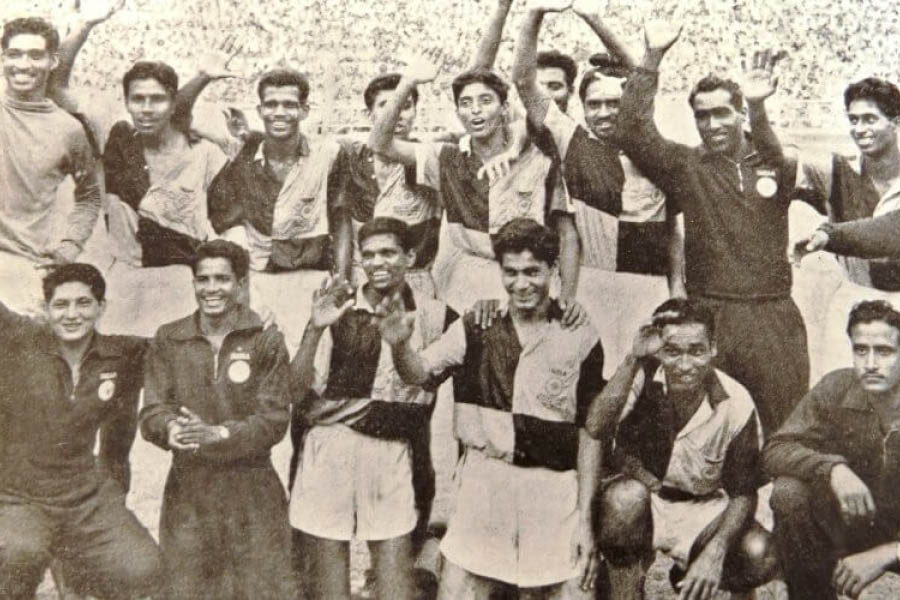Do we Indians know anything about ‘football nationalism’, a wave that changes many non-sports aspects of a nation. It worked like magic in many countries across the globe but not for India.
Now, a Hindi film, Maidaan (protagonist’s role played by Ajay Devgn), is set to be released soon, which has brought into perspective and renewed our opportunity to recall our biggest glory in the world of sports with much pride. We, as a race, have proved it time and again that we are not smart to encash our past pride.
Sad to say we had our best chance in 1962, when under the shadow of Chinese aggression, we won gold in Asian Games football by defeating mighty South Korea in the final in front of a hostile crowd, a feat now no one can even dream of. We not only ignored it but also have made no effort to keep its memories alive for the next generation.
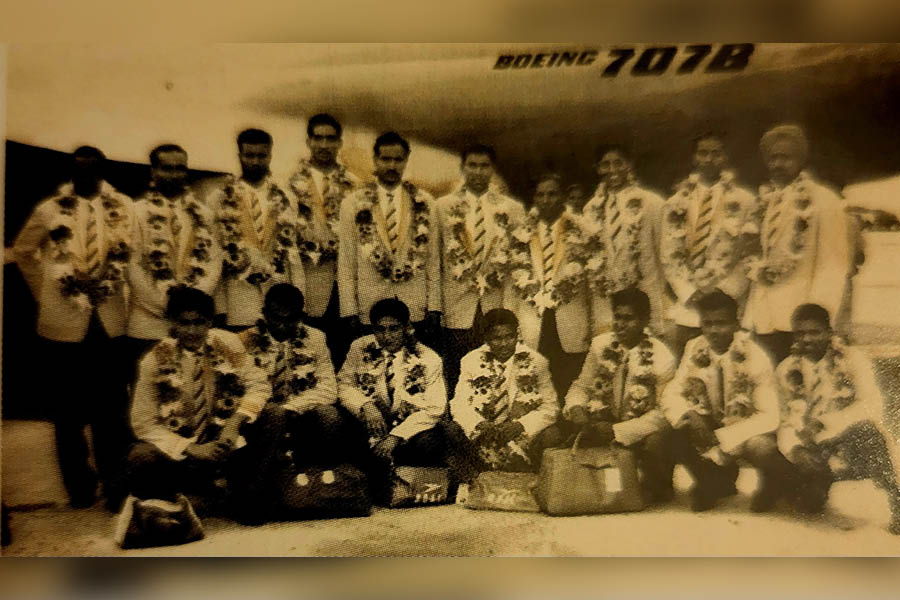
The Indian football team flying to Jakarta in August, 1962, for The Asian Games
A glory that could turn around the soccer mania of the country and could place India on the map of world football from the 1960s itself was allowed to be banished into oblivion.
Except an impact of Mohun Bagan’s victory in the 1911 Indian Football Association (IFA) Shield final against a British regiment football club and huge success of Mohammedan Sporting’s football success from 1934 to 1942 which significantly converted into a strong political narrative that shaped political future of Bengal to great extent this nation has never realised football nationalism in any form.
India as a soccer playing nation in the 1950s and 1960s was not a minnow. In Asia, it was a super power with its considerable success in Asian Games and Asian Cup Championship and thanks to India’s attainment of fourth position in the 1956 Olympics it was a strong contender in the world of football.
Even before the Indian football team took its flight to Jakarta on August 15, 1962, the diplomatic relations between India and Indonesia — the two most cordial international allies — was at an all-time low.
Just before the game began in the Indonesian capital of Jakarta, thanks to the tremendous political pressure from China, the participation of Taiwan as an independent country was questioned. At the same time, objections also came from many Islamic countries for Israel. Surprisingly, the host country, Indonesia, entertained the objections to disqualify both Taiwan and Israel from participating in the game almost at the last moment.
India, as a founder member of Asian Games Federation Congress, strongly placed a protest against such a move by Indonesia.
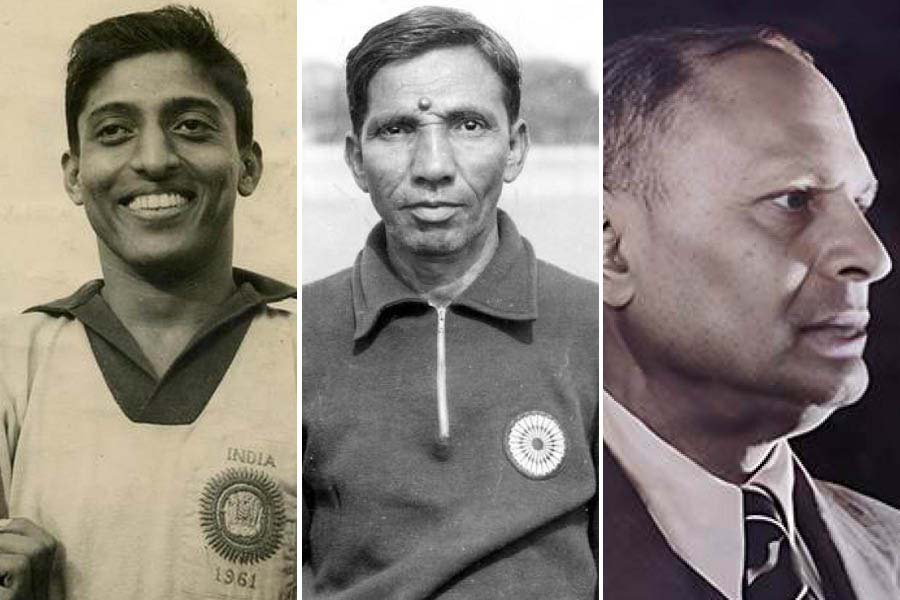
(From left) Chuni Goswami, Abdul Rahim and Guru Dutt Sondhi
Guru Dutt Sondhi, India’s representative in the Asian Games Federation Congress, logically voiced his protest putting the point that both Taiwan and Israel are qualified members of the International Olympic Committee and recognised by AGFC. Thus, Indonesia as a country has no right to keep them away under the pressure of China and some Islamic countries.
Sondhi’s comment and India’s stand created a mayhem in Indonesia.
It caused a strong undercurrent against India and President Sukarno, whose life was once saved by Indian pilot Biju Pattanayak under the instructions of Jawaharlal Nehru from the Dutch army, also openly criticised India.
The Indian Olympic team arrived in Jakarta in August 1962 and from the beginning was subject to public ire and various kinds of abuses everywhere. Whether on the field or off the field, common Indonesian people behaved unkindly with Indians in every event they participated.
The Indian soccer team started its campaign against strong contender South Korea, then champions of Asian Cup football, and India lost to them in the first match by two goals to nil. India’s defeat on the ground turned into a day of celebration in Indonesia.
India came off with flying colours in the next match against Thailand by winning 4 to one. Skipper Chuni Goswami scored the first goal. Jarnail Singh, the star player of the Indian side, after scoring one goal left the field injured with six stitches on his head. PK Banerjee scored two goals.
Thanks to the magical performance of PK Banerjee, Balram and Ram Bahadur India won over the top favourites, Japan, in the next match by two goals to nil. This made India qualify for the semi-final.
Such an unexpected success of India fuelled up the grievances against India among Indonesian citizens who were coming to the stadium in every match to see India’s defeat in every single sport. This sentiment took an ugly shape when it was found that Indian players are becoming subject of verbal and physical abuses in game villages to shopping malls to hotel lobbies wherever they are spotted.
India played its semi-final match against South Vietnam and in the first half itself was advanced by two spectacular goals scored by Jarnail Singh and Chuni Goswami. However, in the second half, India conceived two goals.
Phan Duong and Do Thoi Vinn scored for South Vietnam. However, India seems a little lucky in this match as the report published in The Times of India dated September 2, 1962, says: “Vietnam’s first right wing threatened the Indian goal often…..the winner invited more troubles by keeping only two men on the attack . Vietnam’s right winger shot rebounded off the post.
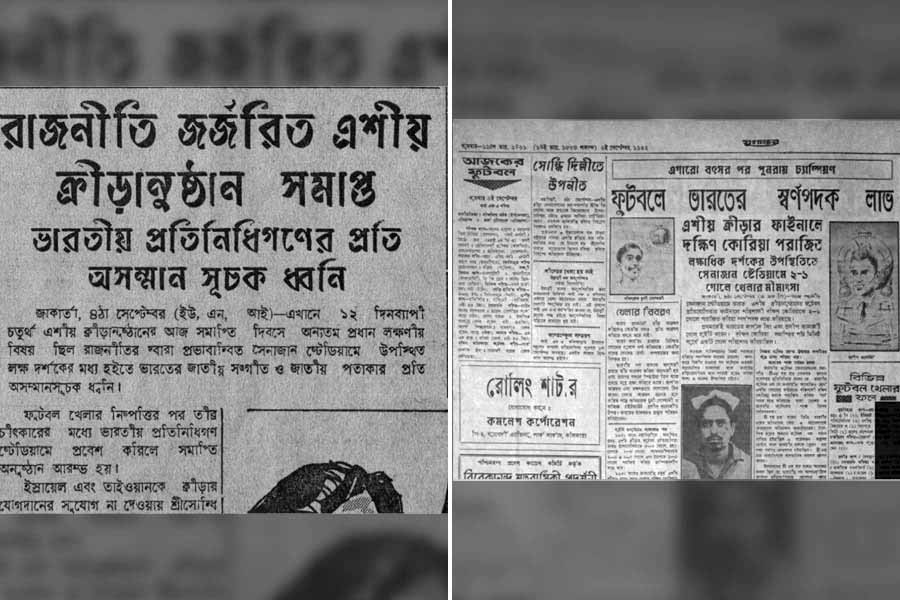
Clipping from ‘Jugantar’ newspaper dated September 5, 1962, reporting the dishonour of the Indian National Anthem and (right) the news of India’s win
In a nail-biting finish in the 75th minute of the game, captain Goswami sparkled again to net a winning goal that took India to the final of Asian Games Football after 11 years. This took India to the threshold of history and also at the edge of serious security issues in a foreign land.
India’s attainment in the final of football triggered large-scale anger and frustration among common Indonesians and now the hate wave converted into physical attack and even a murder threat was received by Sondhi, who was in Jakarta during the game. It was later alleged that the Indonesian government unofficially instructed every airline not to sell any return ticket to Sondhi so that he could leave the country secretly.
The Indian team was given tight security to protect themselves from any unpleasant incident but the fear of physical mob attacks increased manifold when on September 3, a strong mob of nearly 2,000 people attacked and ransacked the Indian embassy in Jakarta. The mob, as assumed, was looking for the Indian ambassador and Sondhi, both of whom were not present there at the time of plunder. The riot-mongers entered the Indian embassy and smashed all furniture, glasspanes and destroyed valuable papers and dishonoured the Indian National Flag. They looted radios, broke telephones and plundered the garden. All this was done to demoralise the Indian football team who were to play their final match against South Korea the next day. This situation became so grave that on that night GD Sondhi was compelled to leave Indonesia on the advice of the government.
On September 4, 1962, more than 1,00,000 spectators assembled at Jakarta’s Senayan stadium to witness India versus South Korea final match and needless to say, the crowd wished to see India’s humiliating defeat on the field. They had already tasted the fun of seeing the Indian hockey team getting defeated by Pakistan in the final.
For India the day started with all odds.
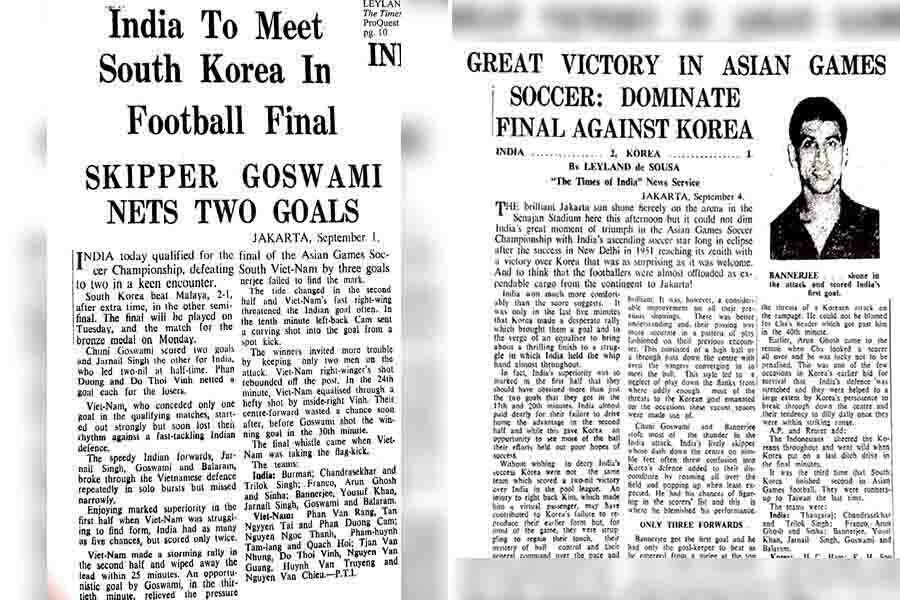
‘The Times of India’ reports dated September 2, 1962, and (right) September 5, 1962 Sporting Times, The Times of India- The 175 Year Journey of Indian Sports
Mentally devastated by the news of the attack on the Indian embassy the day before, Goswami and his boys were subject to humiliation since morning. The banner written ‘India’ was removed from the team bus fearing that it could create public unrest en route from the Games village to the stadium. Moreover, all players were asked to sit far from the window so that their faces were not easily visible from outside. The biggest humiliation came when Jarnail Singh was asked to sit on the floor of the bus because of his turban, which as per the security team, could help riot-mongers recognise him as an Indian.
Legendary coach Syed Abdul Rahim kept on encouraging his boys and telling them for the sake of motherland, no torture was big enough to lose the spirit. Before his boys took on the field, Rahim sung patriotic songs to boost their morale. His cordial and emotional call moved the entire squad.
Neither was there any attraction of winning lucrative commercial assignments from any corporate house nor was there any offer to join government service nor even a hefty cash reward from the Indian Football Association or from anyone else, still a passion of winning gold for the country inspired a team of 11 spirited young Indians on that day in Jakarta’s Senayan stadium. It bonded PK Banerjee of Bengal, Jarnail Singh of Punjab, Tulsidas Balram of Andhra, Peter Thangaraj of Hyderabad, Rambahadur of Dehradun, Chandra Shekhar of Bombay and all others in one single thread. The gang of Goswami was determined to give their best against Asia’s best football team South Korea.
The packed gallery was all against India and for South Korea.
The spectators behaved so badly that they even insulted the Indian National Anthem when it was on at the beginning of the match. The mob hacked every single Indian in the gallery and filled the stadium roaring in the cheer of South Korea. From the very start of the match, every time an Indian player got possession of the ball, the gallery was flooded with unthinkable abusive words and gestures.
However, the skill of game won over uncivilised gestures at the Senajan stadium football ground on September 4, 1962. India smiled with two spectacular goals scored by PK Banerjee and Jarnail Singh who sustained another head injury on that day. In the second half, just five minutes before the final whistle, South Korea managed to reduce the gap by one goal.
As the match came to an end Indian football touched a new zenith. A tearful Rahim, the man behind this saga, hugged a bleeding Jarnail and an exhausted PK. India’s blood, tears and sweat all blended in the colour of victory standing before more than 1,00,000 unfriendly spectators – It was just peerless for any football team in the history of world soccer.
India’s misery did not end after the match. Such was the atmosphere in the stadium that Indians were not allowed to celebrate much in the stadium and the team was packed off to the hotel after a very brief medal ceremony. The Indonesian sports minister honoured Indian team members with a gold medal.
The team was told not to do any big celebration in the hotel and was sent off to India the next day afternoon under very tight vigil.
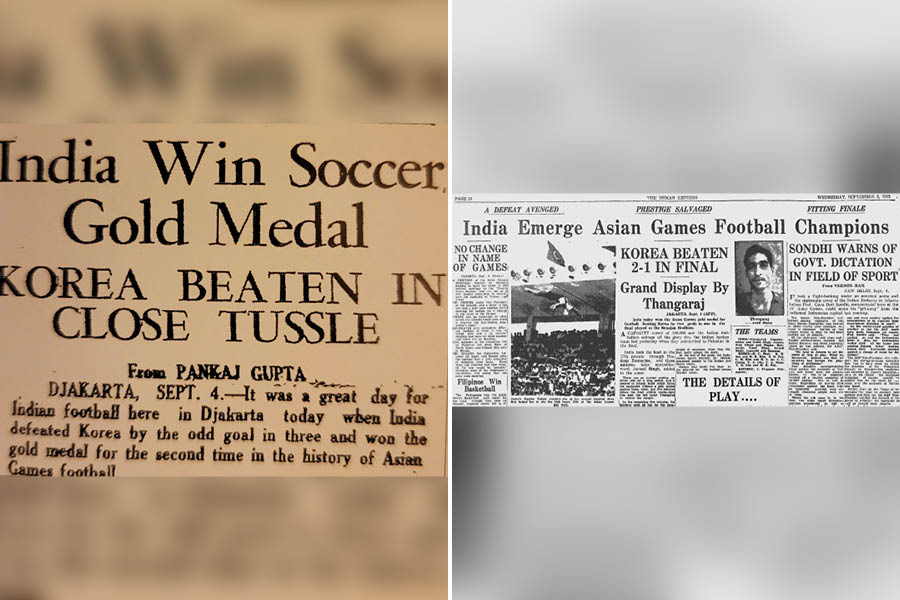
The articles which appeared in ‘The Hindustan Standard’ and ‘The Indian Express’ on the victory Endangered Archives of the British Library
The media back at home was flooded in celebrations. The Indian Express of Madras on September 5, 1962, wrote – ‘A Defeat Avenged: Prestige Salvage: Fitting Finale’. Pankaj Gupta in The Hindustan Standard wrote “It was a great day for Indian football here”. Leyland De Sousa, the sports correspondent of The Times of India, paid a rich tribute on the next day saying: “The brilliant Djakarta sun shown fiercely in the arena of the Senajan stadium here in this afternoon but it could not dim India’s great moment of triumph in the Asian Games Soccer Championship with India’s ascending soccer star long in eclipse after the success in New Delhi in 1951, reaching its zenith with a victory over Korea that was as surprising as it was welcome.”
Popular sports history will always say that the real watershed of Indian sport was June 25, 1983, when a young Kapil Dev lifted the Cricket World Cup at the Lords and that changed Indian sports for ever. However, academic history will differ from that. Academic history of Indian sports will always place Chuni Goswami and his team’s dream run of the 1962 Asian Games gold, which they won in a volatile atmosphere and won it so convincingly.
It is so unfortunate of us that after one month of this gold win in football, India was attacked by China in October 1962. It suffered the most humiliating military defeat after Independence. The mood of the nation was changed to gloom and perhaps there was no scope to celebrate Football nationalism.
We have to wait for a commercial film to come after more than 60 years to know how Rahim’s boy lifted our pride in soccer in an international arena.
